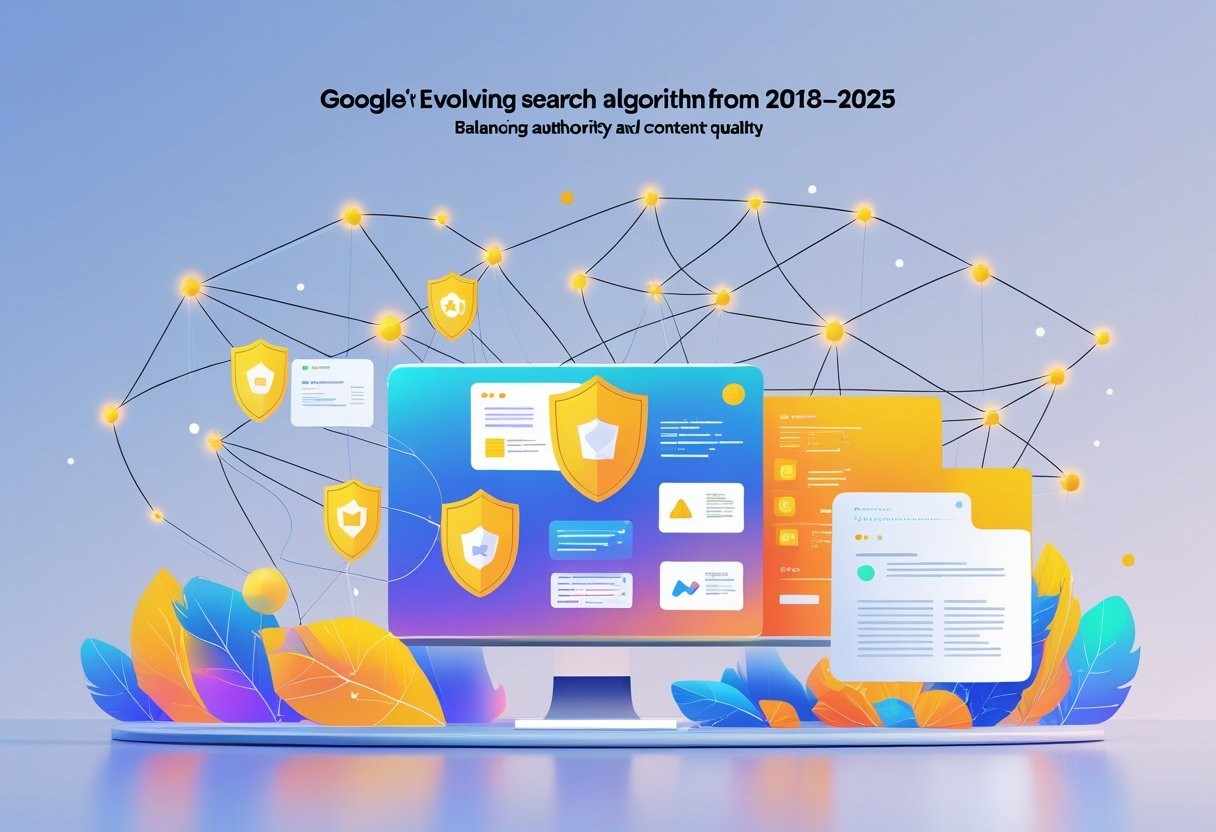Google's Evolving Algorithm: Balancing Authority And Content Quality Since 2018

Google's search algorithm has been on quite the journey since 2018. Think of it like watching your favorite sitcom evolve over several seasons—same characters, but the plot keeps getting more complex.
The BERT update in 2019 taught Google to understand context better than a nosy neighbor. Your keyword stuffing tricks suddenly became as outdated as flip phones.
E-A-T (Expertise, Authoritativeness, Trustworthiness) became the new cool kid on the block. Google started caring more about who wrote your content than how many times you mentioned "best pizza recipe."
The algorithm changes picked up speed in 2020-2021. Google rolled out passage indexing and MUM (Multitask Unified Model).
These updates made search engines understand content like a smart friend who actually gets your inside jokes. By 2024, the Helpful Content Update had website owners scrambling.
Google basically said, "We want content that helps people, not content that helps your ranking." Now in 2025, Google prioritizes authority over keywords in a big way.
The search engine looks at your brand reputation and content quality first. The SERPs now reward sites that prove their expertise through real-world experience.
Your blog won't rank just because it's long—it needs to be trusted by both users and search engines. AI-powered analysis now evaluates content depth and user engagement signals.
Google can tell if people actually find your content useful or if they bounce faster than a rubber ball. The June 2025 core algorithm update brought significant ranking fluctuations.
Sites with strong authority signals saw improvements, while keyword-focused sites took a hit.
Google Provides Clear SEO Guidance: No Need For Tricks And Hacks
Google has made it crystal clear in 2025: stop looking for shortcuts. The search engine giant wants you to focus on creating helpful content instead of chasing the latest ranking hack.
The future of SEO in 2025 will not be about shortcuts or tricks, but about creating real useful content that answers what your audience is looking for. Google's algorithm has gotten smarter at detecting low-quality tactics.
Your SEO strategies should focus on user value rather than trying to game the system. When you create content that genuinely helps people, Google notices.
What Google Actually Wants:
- High-quality, helpful content
- Fast loading websites
- Good user experience
- Clear search intent matching
- Regular content updates
The rise of AI overviews and zero-click searches means your content needs to be even more valuable. Users might get quick answers without clicking through to your site.
Google's guidance emphasizes E-E-A-T: Experience, Expertise, Authoritativeness, and Trustworthiness. You can't fake these qualities with tricks.
Simple beats complex when it comes to SEO in 2025. Focus on understanding what your users actually need.
Answer their questions clearly and completely. The search engine wants to reward sites that provide genuine value.
The Importance Of YMYL (Your Money Or Your Life) & E-A-T (Expertise, Authority, Trust)
Think your cat blog doesn't need to worry about credibility? Think again.
Google's getting pickier than a food critic at a gas station hot dog stand. YMYL content affects a person's happiness, health, or financial stability.
This includes everything from medical advice to investment tips to news articles. E-E-A-T now includes Experience alongside the original trio.
Google wants to see you've actually done what you're talking about, not just read about it on Wikipedia.
Here's what matters most in 2025:
| E-E-A-T Factor | What Google Wants | How to Show It |
|---|---|---|
| Experience | First-hand knowledge | Case studies, personal stories |
| Expertise | Deep understanding | Credentials, detailed content |
| Authority | Industry recognition | Quality backlinks, mentions |
| Trust | Reliability | Secure site, contact info |
Small businesses in YMYL categories like health and finance face particularly strict standards. Your search engine ranking depends on proving you're not some random person dispensing advice from your basement.
User-generated content can boost your credibility when managed properly. Customer reviews and testimonials show real people trust your expertise.
Don't try to fake expertise—Google's AI algorithms are smarter than your attempts to sound authoritative. Focus on building genuine credentials and demonstrating real experience in your field.
The search engine wants to see you're a legitimate expert, not someone who stayed at a Holiday Inn Express last night.
Core Web Vitals: Technical Performance For Ranking
Google's Core Web Vitals have become the strict hall monitors of the internet. They watch your site's every move and report back to the search engine about how well you treat your visitors.
These three main metrics determine if your site gets a gold star or detention in search results. Largest Contentful Paint (LCP) measures how fast your main content loads.
First Input Delay (FID) tracks how quickly your site responds when users click buttons. Cumulative Layout Shift (CLS) catches those annoying page jumps that make you click the wrong thing.
Technical SEO in 2025 demands faster loading times and smoother user interactions. Your ranking depends on passing these performance tests.
| Core Web Vital | Good Score | What It Measures |
|---|---|---|
| LCP | Under 2.5 seconds | Main content loading speed |
| FID | Under 100 milliseconds | Click response time |
| CLS | Under 0.1 | Page layout stability |
Schema markup helps search engines understand your content structure better. This structured data gives Google clear signals about your page organization and content hierarchy.
Internal linking creates pathways that help both users and crawlers navigate your site efficiently. Smart internal links distribute page authority and guide visitors to related content.
Core Web Vitals optimization in 2025 requires monitoring real user data, not just lab scores. Google cares more about actual visitor experiences than perfect test results.
Your site needs to optimize images, reduce JavaScript bloat, and eliminate render-blocking resources to improve these vital signs.
The AI Revolution: Impact On Content Creation And Google's Algorithm 2023-2025

AI has completely flipped the script on how search engines work. Your old SEO playbook? It's about as useful as a chocolate teapot now.
Google's algorithm changes have been coming faster than coffee shop price increases. The search engine has rolled out AI Overviews and AI Mode features that are reshaping how millions find information online.
Here's the plot twist: 82% of people find AI-powered search more helpful than traditional search results. Yet only 22% of marketers are tracking their brand visibility in AI tools.
Your content creation process needs a serious makeover. AI content tools are everywhere, but Google's getting smarter at spotting lazy AI-generated content that adds zero value.
The winning strategy? Use AI to enhance your content, not replace your brain. Google acknowledges AI's role in content creation but wants you to balance automation with human oversight.
| AI Impact Area | What Changed | Your Move |
|---|---|---|
| Content Quality | AI detection improved | Add human expertise |
| Search Results | AI Overviews appear | Optimize for featured snippets |
| User Behavior | 49% click through AI answers | Create click-worthy content |
The search experience is fracturing across platforms like ChatGPT and Perplexity. Your ranking strategy needs to work everywhere, not just Google.
Summary Of Key Takeaways For 2025 SEO

The SEO landscape in 2025 demands a strategic focus on content authenticity, technical precision, and AI integration. Search engines are prioritizing user experience while implementing stricter guidelines for sensitive content areas.
Quality Content Remains Paramount
Your content strategy needs a serious reality check in 2025. Gone are the days when you could stuff keywords into mediocre blog posts and call it a day.
Search engines now evaluate content like a picky food critic at a five-star restaurant. They want to see genuine expertise, real experience, and authentic value for users.
E-E-A-T (Experience, Expertise, Authoritativeness, Trustworthiness) has become the golden standard. Your content must demonstrate that you actually know what you're talking about.
This means showcasing author credentials, including case studies, and proving your industry knowledge through depth-focused content. The rise of AI-powered search platforms has transformed how users interact with search results.
These platforms prioritize natural language content and draw from authoritative sources. You need to optimize for featured snippets and AI-generated summaries.
Structure your content in conversational Q&A formats that directly answer user queries.
Key content requirements for 2025:
- Clear, direct answers for snippet placement
- Natural language patterns for voice search
- Comprehensive topic coverage that demonstrates expertise
- Human experience emphasis while maintaining SEO best practices
Technical Excellence Is Non-Negotiable
Technical SEO has evolved from "nice to have" to "absolutely essential" in 2025. Your website's technical health directly impacts your ability to rank and maintain visibility.
Core Web Vitals and frequent algorithm updates have elevated technical requirements. Sites must maintain robust technical foundations to withstand algorithm changes.
Mobile performance standards are particularly crucial. With mobile sessions accounting for 60% of web traffic, Google's mobile-first indexing demands flawless mobile execution.
Monthly technical audits should cover:
- Page speed optimization
- Broken link identification and repair
- Metadata accuracy and completeness
- Image optimization and caching implementation
- Touch-friendly navigation design
Your Core Web Vitals metrics require constant monitoring. Any technical issues must be addressed promptly to maintain search rankings.
Visual search capabilities also demand attention to image optimization. Use descriptive alt text and implement proper Image Object Schema markup.
Essential technical elements:
- Responsive design with fast loading times
- Proper schema markup implementation
- Clean URL structures and internal linking
- SSL certificates and security protocols
AI's Dual Role
AI is playing a fascinating double role in 2025 SEO. It's both your best friend and your biggest challenge.
You need to understand how to use AI tools. You also need to optimize for AI-powered search experiences.
AI tools are transforming SEO execution by providing real-time insights and automating routine tasks. These platforms reveal how your brand appears in AI search experiences like ChatGPT and Perplexity.
The emergence of SearchGPT and other AI search platforms has shifted search from link lists to conversational experiences. Users now expect direct answers rather than clicking through to websites.
Zero-click searches dominate the landscape. With 60% of Google searches ending without clicks, your visibility in featured snippets and AI-generated summaries becomes critical.
You must optimize content specifically for these AI-powered results. This means creating comprehensive, accurate company profiles on authoritative platforms.
Maintaining strategic metadata is also essential. Make sure your content is easily discoverable by AI systems.
AI optimization strategies:
- Implement Speakable Schema for voice search
- Create content that answers natural language queries
- Maintain accurate business information across platforms
- Use AI tools for content gap analysis and trend prediction
Human-AI collaboration is essential for success. You can't rely solely on AI-generated content, but you also can't ignore AI's role in modern SEO strategy.
Transparency From Google
Google has become surprisingly chatty about their ranking factors and algorithm updates in 2025. This increased transparency is both helpful and demanding for your SEO strategy.
The search engine giant now provides clearer guidance about what they value in content and websites. They've emphasized the importance of user experience signals and quality metrics.
Google's updated guidelines focus heavily on:
- Authentic user experiences and genuine expertise
- Content that serves real user needs rather than search engines
- Technical performance that enhances user satisfaction
- Brand authority and trustworthiness signals
You need to stay updated with Google's official communications through Search Console and their blog posts. Algorithm updates are announced more frequently with detailed explanations.
This transparency means you have better insight into ranking factors. However, it also raises the bar for compliance.
Google expects you to follow their guidelines precisely. Staying informed is more important than ever.
The antitrust ruling against Google is creating additional changes in the search landscape. You should prepare for potential shifts in how search results are displayed and ranked.
Action items for transparency:
- Monitor Google Search Console messages regularly
- Follow official Google SEO guidance updates
- Implement recommended technical improvements promptly
- Document your SEO efforts for compliance purposes
Increased Scrutiny For Sensitive Topics
Google has significantly tightened their evaluation standards for sensitive topics in 2025. If your content touches on health, finance, safety, or other YMYL (Your Money or Your Life) areas, you're under a microscope.
The search engine now applies stricter quality standards to content that could impact user well-being or financial decisions. Your expertise credentials must be clearly displayed and verifiable.
High-scrutiny topic areas include:
- Medical advice and health information
- Financial planning and investment guidance
- Legal advice and regulatory information
- Safety recommendations and emergency procedures
You must demonstrate clear qualifications and cite authoritative sources for any claims in these areas. Unsubstantiated advice or outdated information will hurt your rankings severely.
Expert author bios have become crucial for sensitive content. Include detailed credentials, certifications, and relevant experience information.
Regular content audits are essential to ensure accuracy and currency. Outdated medical or financial information can trigger ranking penalties.
Compliance requirements:
- Verified expert authors for sensitive topics
- Current, accurate information with recent update dates
- Authoritative source citations and references
- Clear disclaimers where appropriate
- Regular fact-checking and content reviews
Frequently Asked Questions
AI is reshaping how search engines work and what SEO experts need to focus on in 2025. Voice search technology is evolving beyond simple commands, while traditional SEO practices adapt to new ranking systems and user behaviors.
How will AI redefine the SEO game by 2025?
AI is completely changing how search engines understand and rank content. Instead of just matching keywords, AI now reads content like a human would.
It looks at context, meaning, and user intent to deliver better search results. AI Overview optimization will increase as more search results include AI-generated summaries.
These summaries appear at the top of search results and answer questions directly. This means you need to optimize for both traditional rankings and AI overviews.
Search engines use AI to understand what users really want when they type a query. If someone searches for "best pizza," AI knows they probably want local restaurants, not pizza recipes.
Your content needs to match this deeper understanding of search intent.
What will SEO experts be doing after robots take over their jobs?
SEO experts aren't going anywhere—they're just changing what they do. Instead of keyword stuffing and link schemes, they're becoming content strategists and data analysts.
Modern SEO experts focus on generative engine optimization alongside traditional search engine optimization. This means optimizing content for AI tools like ChatGPT and Claude, not just Google.
The smartest SEO experts are learning to use AI tools to make their work better. They use AI to analyze data, create content outlines, and understand user behavior patterns.
It's about working with robots, not against them.
Can we use carrier pigeons if search engines become too smart in 2025?
While carrier pigeons have excellent organic reach, they're terrible at handling voice search queries. Plus, their click-through rates are disappointing when users realize the message is just bird droppings on paper.
The real answer is that search engines becoming "too smart" actually makes SEO more important, not less. When AI understands content better, high-quality, helpful content wins big.
Bad content gets buried faster than ever. Smart search engines reward websites that truly help users.
This means focusing on user experience, fast loading times, and content that actually answers questions. It's like having a really good teacher who can spot fake work immediately.
Is SEO still a thing or has Google's algorithm achieved sentience by 2025?
SEO is very much still a thing, but it looks different now. Google's algorithm hasn't achieved sentience (yet), but it's gotten much better at understanding what users want.
This makes good SEO practices more important than ever. The shift toward mid-to-lower funnel content means focusing on content that helps users make decisions.
Instead of just explaining what something is, you need to help people choose between options and take action. Traditional SEO tactics like keyword research and link building still work.
Now you also need to think about how AI tools will use your content to answer user questions. It's like preparing for two tests at once.
Will 'voice search' in 2025 mean just yelling at our screens?
Voice search in 2025 is much more sophisticated than yelling commands. People use natural language and ask complete questions.
They might say "What's the best Italian restaurant near me that's open right now?" instead of "Italian restaurant near me." Your content needs to answer these conversational queries.
Write in a way that sounds natural when spoken aloud. Use complete sentences and answer questions directly at the beginning of your content.
Voice search results often come from featured snippets and local search results. This means optimizing for position zero (the featured snippet spot) and keeping your local SEO information updated and accurate.
What are the odds that SEO tactics will involve time travel by 2025?
The odds are zero, but that would solve a lot of ranking problems! Instead of time travel, SEO experts are focusing on predicting future trends and preparing for algorithm changes before they happen.
Schema markup is becoming more important as it helps search engines understand your content structure. It's like giving search engines a roadmap to your content instead of making them guess what everything means.
The closest thing to time travel in SEO is using data to predict what users will search for next. Tools can analyze trends and help you create content for topics that are about to become popular.